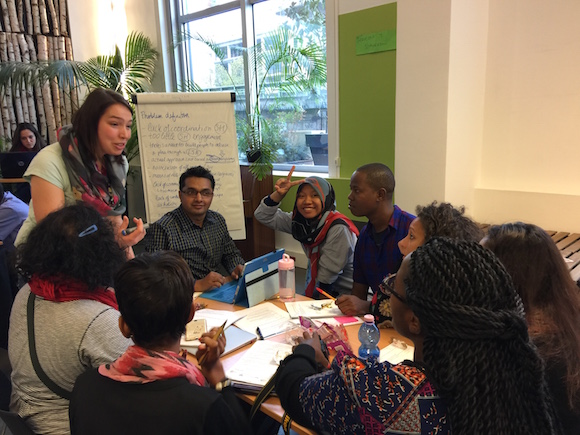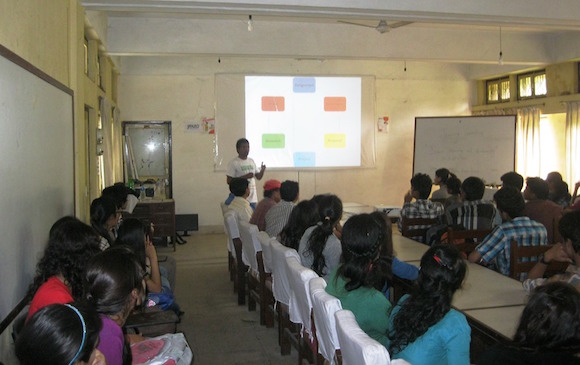Last year, I was fortunate to be one of the 10 young champions who were part of the Education Landscape Challenge in 2015 under the mentorship of Cora Van Oosten and James Mulkerrins from the Wageningen UR Centre for Development Innovation – with the support of other Challenge Partners from Landscapes for People, Food and Nature, Wageningen UR, EcoAgriculture Partners, and the World AgroForestry Center.
I still remember Cora saying that Education Landscape Challenge at Youth In Landscape Initiative came to light before the launch of the call for youth innovators. However, our team developed the idea of an online self-assessment tool, called LandSelf which allows you to enter your current knowledge and skills and in return generates a customized curriculum to fill the gaps in your landscape knowledge.
Last year, I was fortunate to be one of the 10 young champions who were part of the Education Landscape Challenge in 2015 under the mentorship of Cora Van Oosten and James Mulkerrins from the Wageningen UR Centre for Development Innovation – with the support of other Challenge Partners from Landscapes for People, Food and Nature, Wageningen UR, EcoAgriculture Partners, and the World AgroForestry Center.
I still remember Cora saying that Education Landscape Challenge at Youth In Landscape Initiative came to light before the launch of the call for youth innovators. However, our team developed the idea of an online self-assessment tool, called LandSelf which allows you to enter your current knowledge and skills and in return generates a customized curriculum to fill the gaps in your landscape knowledge.
With this background of knowledge and experiences, I came to develop the concept of education training module, called EduMala Mentoring Program which is a blended online/offline mentoring program run by YPARD Nepal . The program aims at building the interpersonal skills of Nepalese young agricultural professionals. We started our journey since January 2016 where we are adopting peer-peer assessment technique using e-learning, downloadable content (in English and Nepali), and online conference meeting to interact among mentors and mentees.
At this platform, I am working as Coordinator of EduMala, and our 6-member team includes Abhishek Khadka, Ishwora Dhungana, Lok Raj Joshi, Santosh Adhikari, and Dilip Bhandari. We all are working voluntarily, but the benefit for us is an opportunity to grow up professionally by improving our sharing skills.
We conducted our first batch with 34 mentees in between 3rd January and 13th February 2016 which was 5 weeks long course with 5 mentors i.e., every week different mentor with same mentees. On an everyday basis, a mentor uploads his/her 1-2 pages long brief document as PDF prior to exact session date and mentees are supposed to discuss after reading those materials. With the materials supplied, the mentees can put their queries to the mentors.
The model of second batch was similar with previous session including 40 mentees in between 27th March and 7th May 2016. We believe, the mentees got quality time to familiarilize themselves with skills in effective communication, networking, writing research proposals and publishing in academic journals, government policies in youth entrepreneurship, food preservation techniques and event management in our first and second batches.
The third batch was focused on a particular session, Managing Livestock-based Community Development Projects, with 25 mentees in between 8th August and 19th August 2016. At this moment, we have successfully completed three batches of the mentoring session. Altogether, we have 99 mentees (among them 35 were female) who benefited from our mentoring program. We randomly selected 45 mentees for online survey and their responses were;
- More than 80% of mentees were spending at least 1 hour every day.
- More than 95% of mentees were satisfied or totally satisfied with courses that we offered.
- More than 81% of mentees agreed with their expectation that what they want to learn.
- About 90% of mentees were satisfied with the instructor’s way of communications.
- 4/5- rating of EduMala website; More details about survey: http://ow.ly/5wcR305FZKk
Read here some of the reflections from mentees: EduMala as a Turning Point, An Encouraging Effort to Develop Interpersonal Skills, EduMala Online Platform Boosts Learning Opportunities, EduMala: A New Learning Experience, and also a reflection from mentor: EduMala: A Learning Platform of Facilitators.
Currently, we are in planning phase for up-coming year’s mentoring program which will be with more mentors for young farmers, students, entrepreneurs, researchers and development workers across Nepal to promote agriculture networking, mentoring and entrepreneurship skills.
We know that education is important, however, there are lots of things missing in education in terms of soft skills like, interpersonal skills. There is an existing gap between formal education in what is being taught and what’s needed, and hence we would like to build on the landscape professional competencies.
Professionals want to share; youth wants learn; that’s why the platform arises. Besides being a platform, EduMala is a visionary, dynamic and innovative idea. So we encourage you to be the part of it. If you would like to know more about our program, or interested to join as mentor (for particular session), please send us an email to This email address is being protected from spambots. You need JavaScript enabled to view it..
Dinesh Panday is originally from Nepal, working as Communications officer at YPARD Asia and Pacific Coordination Unit and Nepal representative at YPARD. Academically, he is a PhD scholar in Soil and Nutrient Management at University of Nebraska-Lincoln, United States.


